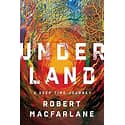
Underland: A deep time journey, by Robert Macfarlane, is one of those rare books that defies categorization. Naturalists will love it, as will history buffs, as will those of a more philosophical bent.
It is about our relationship with that which lies beneath, the underland.
Macfarlane ranges around the world and through time, pulling together the traces that bind us to a continuum of rock and flesh and spirit. It is a lyrical, contemplative book, beautifully written. It manages to capture both the deep ecological loss of the current era and the enduring splendor of nature.
From the chapter, Burial, he descends below Somerset, England, into a bedding plane, formed of sediment on an ancient seabed. Millions of years of movement have opened space in the strata and he and his companion descend into “this deep time space, this deep time vice.”
“In that vanishing point, neither of us speaks. Language is crushed. We are anyway to busily engaged building structures within ourselves that might house our spirits, for pressure here is immense, a weight of rock and time bearing down upon us from every direction with an intensity I have never experienced before, turning us fast to stone. It is a fascinating and terrible place, and not one that can be borne for long.”
From that extreme claustrophobic setting he moves to the far edge of our understanding of the cosmos from a vantage point more than half a mile under the earth and sea, off the coast of northeast England. There, in a salt mine where scientists seeking the ultimate quiet search for evidence of dark matter, he digs with an introspective researcher named Christopher, at the deepest of human questions. Does God exist? What is the nature of reality? Macfarlane asks Christopher if knowing that 100 trillion neutrinos pass though his body every second changes the way the world feels.
After much though Chrisopher responds: “At the weekends, when I’m out for a walk with my wife, along the cliff tops near here, on a sunny day, I know our bodies are wide mesh nets, and that the cliffs we’re walking on are nets too, and sometimes it seems, yes, as miraculous as if in our everyday world we suddenly found ourselves walking on water, on air. And I wonder what it must be like, sometimes, not to know that.”
He pauses, and it is clear that he is thinking now beyond the confines of the salt cavern, beyond even the known limits of the universe.
“But mostly, and in several ways, I’m amazed I’m able to hold the hand of the person I love.”
And on it goes.
Through the spooky catacombs under the great city of Paris, to the karst of eastern Europe, to Norway and its Maelstrom, Macfarlane explores the underland and its connection to our collective psyche.
This is a beautiful book that can be read and re-read. It left me wondering what lies under the limestone pavings of Carden, where noisy flowing ground water suddenly disappears into blackness and silence.
This book is reviewed by Mark Bisset, executive director of the Couching Conservancy and an avid reader. He really thinks people will find it interesting. Thanks Mark.
